The second episode of my Cingapore series.

After a very dramatic move and draining month in Cingapore, É and I headed to Singapore State Courts to seek help; lost in desperation of what to do.
I doubt this makes the most interesting of posts but when we were trapped in the situation, we tried Googling similar stories; how they dealt with or go about it but couldn’t find any thorough ones. Hence, I suggest bookmarking this post so that if you ever find yourself in our shoes or if you’d like to understand how to file a small claim in future, this is how you do it and what you can expect from it.
Seeking Justice in Singapore
Everyone at the State Courts was warm, friendly and emphatic while everything moved swiftly. Unlike any other government services in the world, here, someone has figured out all the processes that take place and how to structure them within the office to increase productivity without wasting anyone’s time.
P.S. Before heading to court, always seek an amicable agreement first as court takes time. (We tried a couple of times but the kiasu hardheaded landlady insisted not to meet in the middle.) If all else fails, here is:
How to Apply Small Claims in Singapore State Courts
DAY 1
1. Arrange an appointment for legal advise.
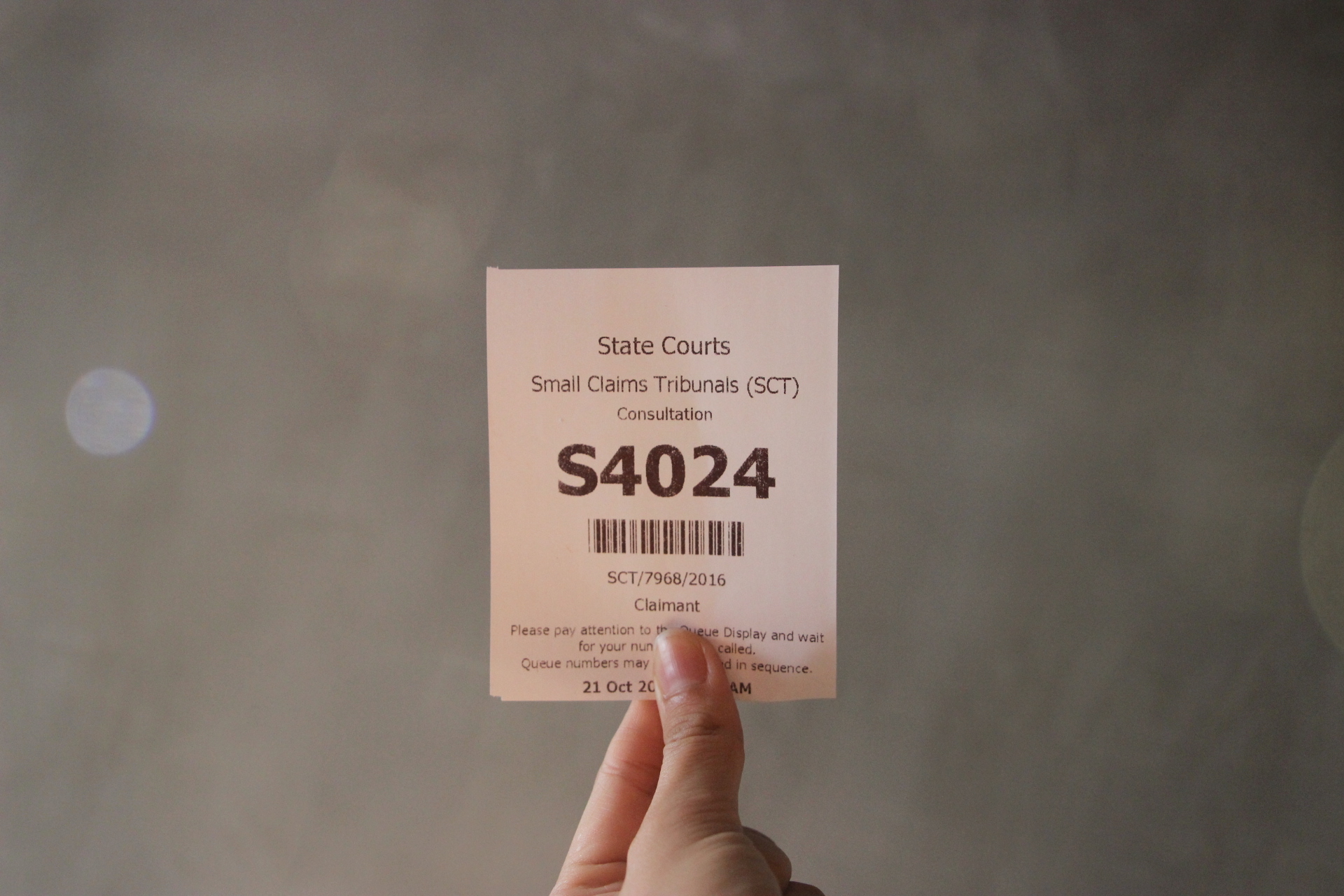
Why you need this: Here is where you’re advised on whether your case is worth going to court. Also, it is free of charge.
Every case gets a free 20-minute consultation with an actual lawyer, which you can use only ONCE per case. Young, practicing lawyers may be present in the room as well. The first appointment is at 10 a.m.
Best advice: Arrive at 9 a.m. to get your waiting number. (We did that and started our consultation at 10.30 a.m.). From this session, the lawyer will advise (not guarantee) whether you have a winning case. “You definitely have a case. Drag them to court!”, sounded like music to my ears.
2. Find the Small Claims department (just ‘next door’).
If you ‘have a case’, proceed to Small Claims. Take another waiting number. Upon your number being called, you will be given a form to take home and advised on how to fill it up. Listen attentively to the latter.
DAY 2
3. Prepare your case.
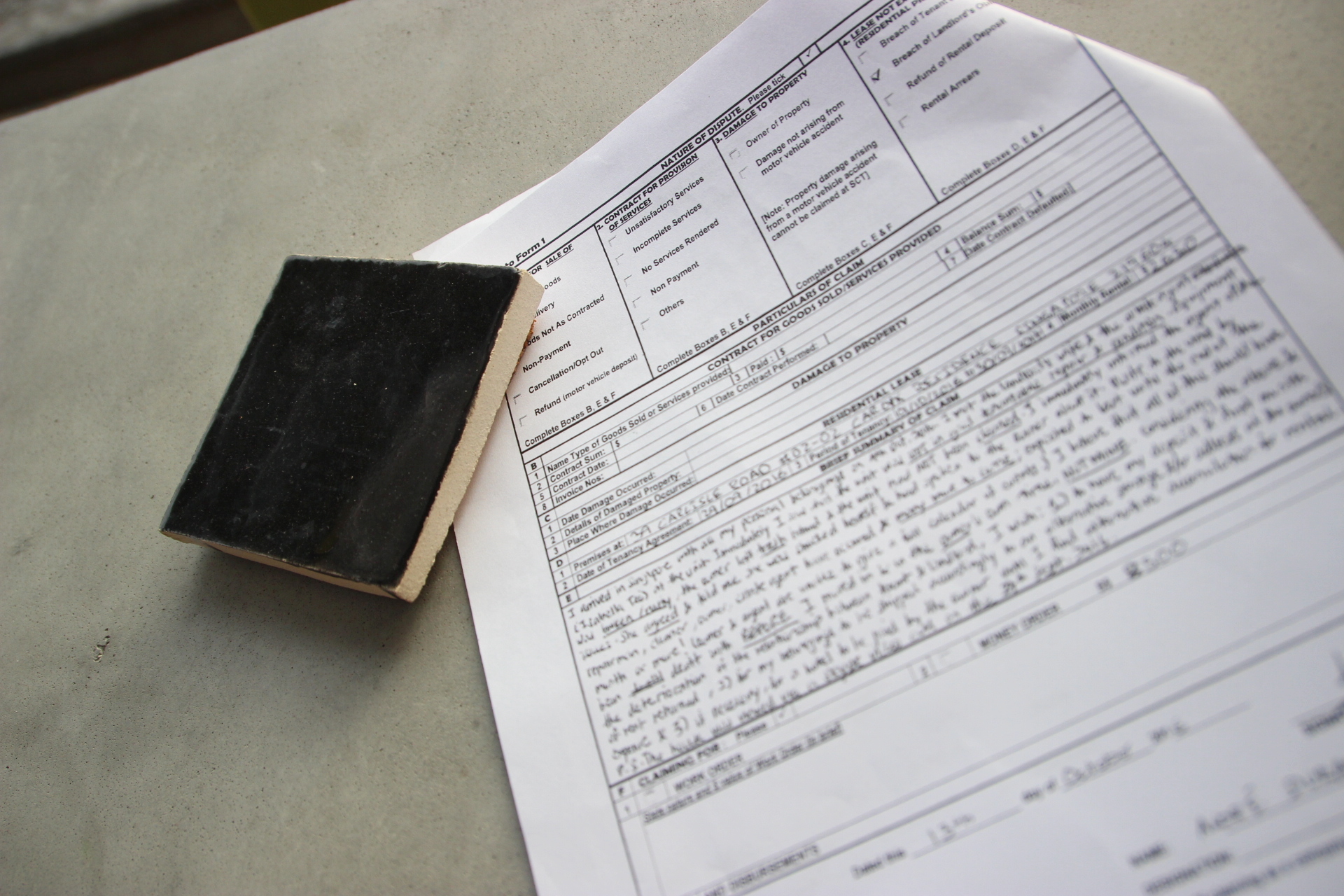
Time to do your homework! Fill up the given form and make a list of items you need to attach upon submission. The form is only a one-piece A4 paper, front and back.
4. Compile evidences.
Speaking from experience, I’d say your list should include:
a) Documents: Contracts, Whatsapp chats, email, etc. printed out (we even highlighted important points).
b) Developed pictures as evidences (we added captions behind each photo).
b) Total sum of claim (must be justifiable but still negotiable during mediation #8).
c) Photocopy of your passport.
d) 20 SGD.
DAY 3
5. File your claim.
Make your way to Small Claims again. The sooner you submit your case, the sooner your problem can be solved = the sooner you can get yourself OUT of the crappy situation.
Upon submission of #4, within 10 minutes you will be given the date of your mediation, which will be between 7 to 10 days.
6. Serve the respondent his notice.
Head over to the respondent’s house to serve him his notice. Basically, the court will give you a piece of document (you find the envelop) to be delivered to the crook.
There are 3 ways you can do this but we were advised by the staffs the option of personally handling it over after considering the pros and cons. Other options: mail and courier. The main con with the latter options is the possibility that the respondent could claim he was ‘not home’, hence is not aware of it. This delays your entire mission.
As a claimant, you will need to write a (very) simple report to be brought along during the mediation.
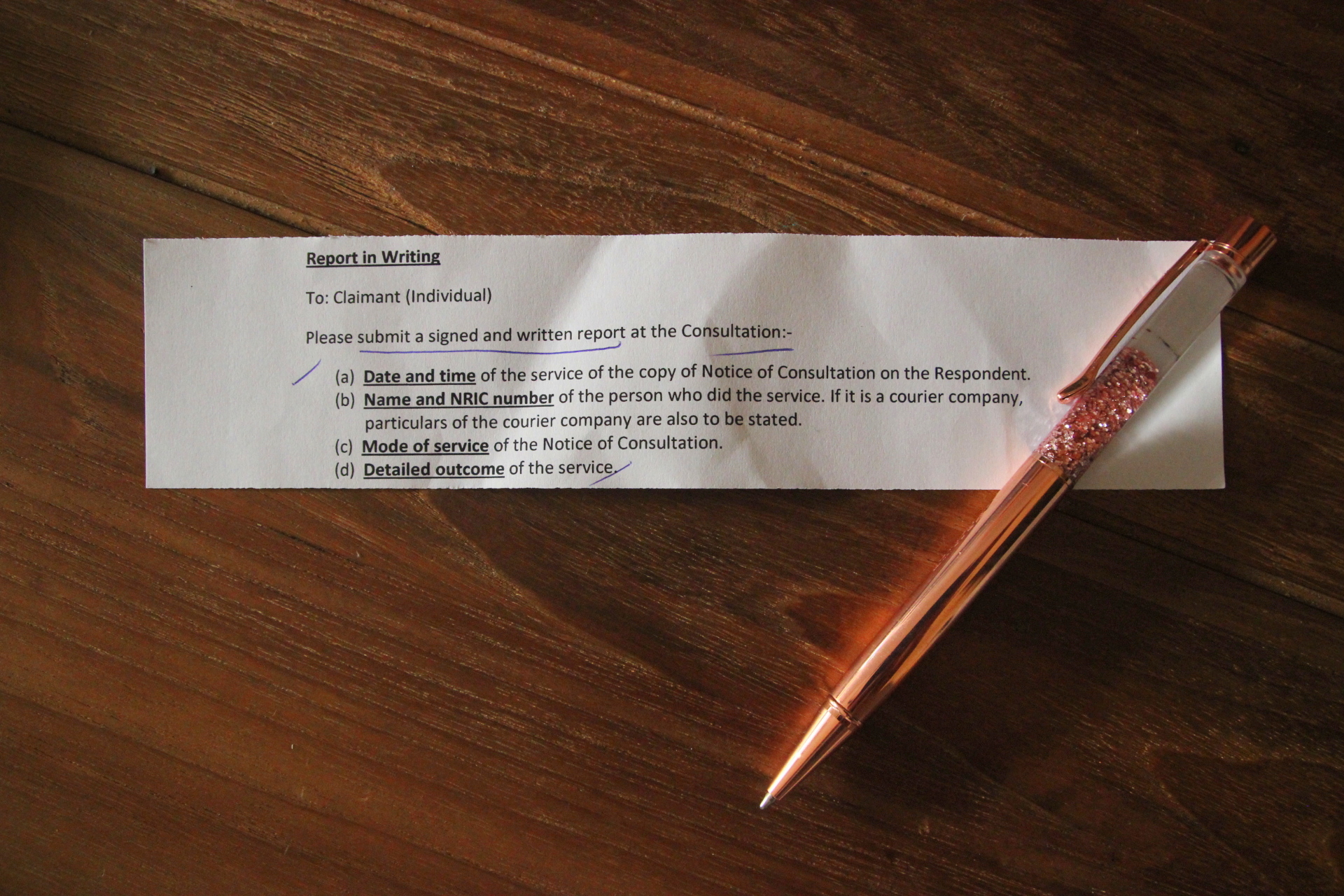
7. Seek advise.
Do you have a friend or family member who studied law or is a lawyer? Reach out to them and ask for their advise. This helps tremendously as someone out of the picture, especially a lawyer, would be able to share different angles out of the box which you didn’t think of. I have my dad and a lawyer friend, Dixon, to thank so much for that. Without them, we wouldn’t have made it this far.
DAY 10
8. Attending the mediation.
This would be your third visit to the State Court. Do not be late and don’t forget to bring:
a) Your report (#6).
b) Breakdown of the sum of your claim.
c) Receipt of Stamp Duty paid (if it is the same case as us).
d) Any extra / new evidences.
Your session will be held at:
Registrar of the Small Claims Tribunal, 1st Level, State Courts, 1 Havelock Square, Singapore 059724.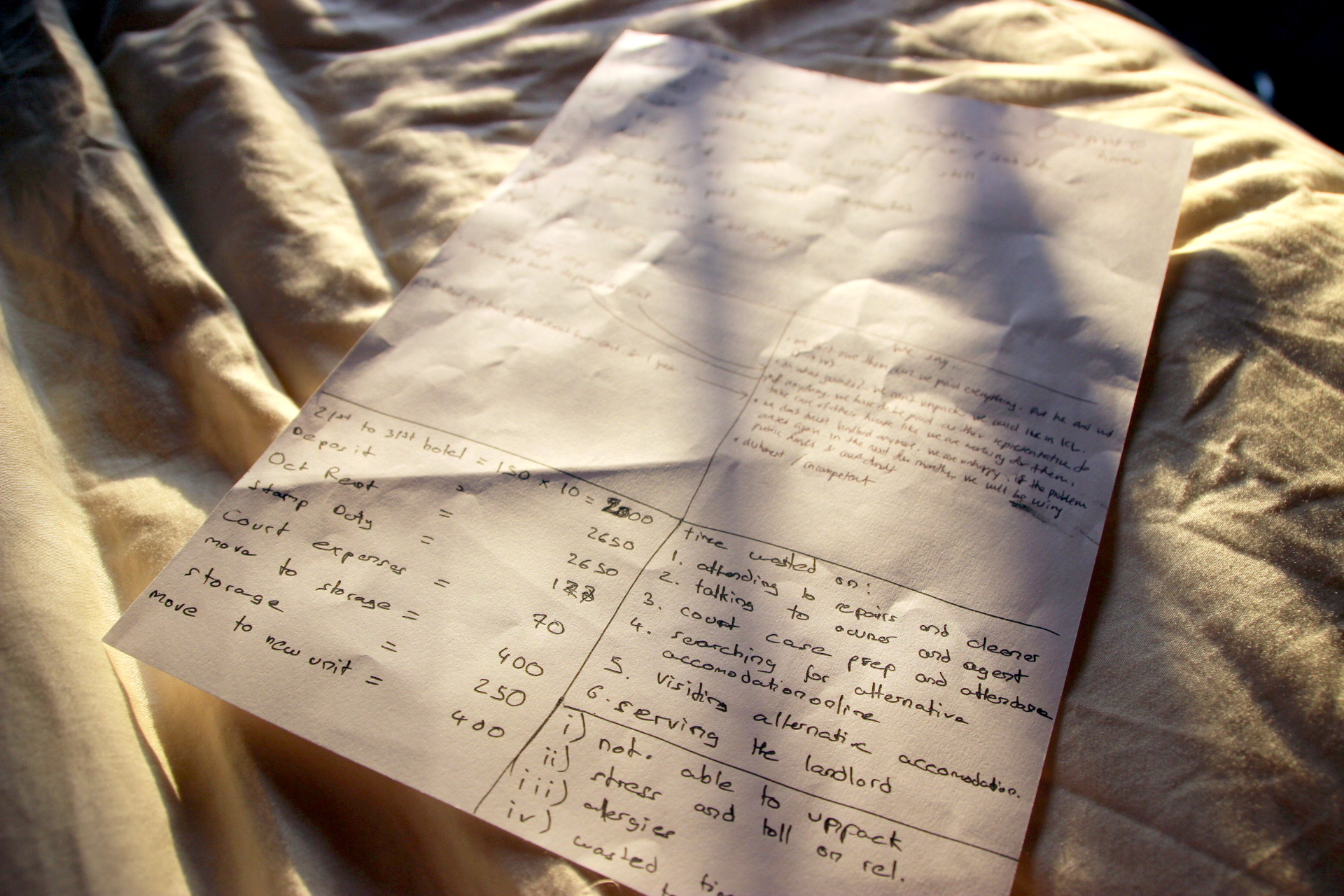
What is a mediation and who attends it?
Only the person’s name in the contract(s) should be present. No representatives, uncle, grandma, wife, etc. A lawyer will be present to act as a ‘mediator’ between two parties.
Try your absolute best to sort things out through this session instead of waiting for the hearing. Lawyers had advised us so because time is money (if not more) and depending on cases, the priority is to get out of the crap a.s.a.p.
Tips: Know your bottom line and bottom bottom line (What is an acceptable minimum you can live / walk away with?). This simple tip from Dixon is what saved us. Be reasonable. Don’t dress too casual and please don’t get emotional.
DAY X
9. Hearing day.
Only AFTER the mediation will there be ONE ‘hearing’ where a judge is present. This hearing will determine whether you win, lose, or even if your case is totally dismissed! Which is another reason why it is best to find a solution and mediate during #8. If the judge dismisses your case, that’s it. The lawyers you sought are not hold accountable for as they are only there to ‘advise’.
We managed to go separate ways with our bottom bottom line to save time, reduce risks and more importantly, start living our new city, Cingapore.

What We Won / Lost
In my view, in the end everybody won and lost; a bit of both. For us, getting to save more time by skipping the hearing, reclaiming our life and regaining our happiness by escaping the contract from hell is a win (even when we are 95% sure that if we went all the way, we could win the full claim)!
The respondents however, believed they were absolutely defeated; walking out of the tribunal raged in anger, bruised ego and heads full of pride. (We overheard the landlady scolding her husband, the landlord, that he was ‘cheated’ by us. lol?)
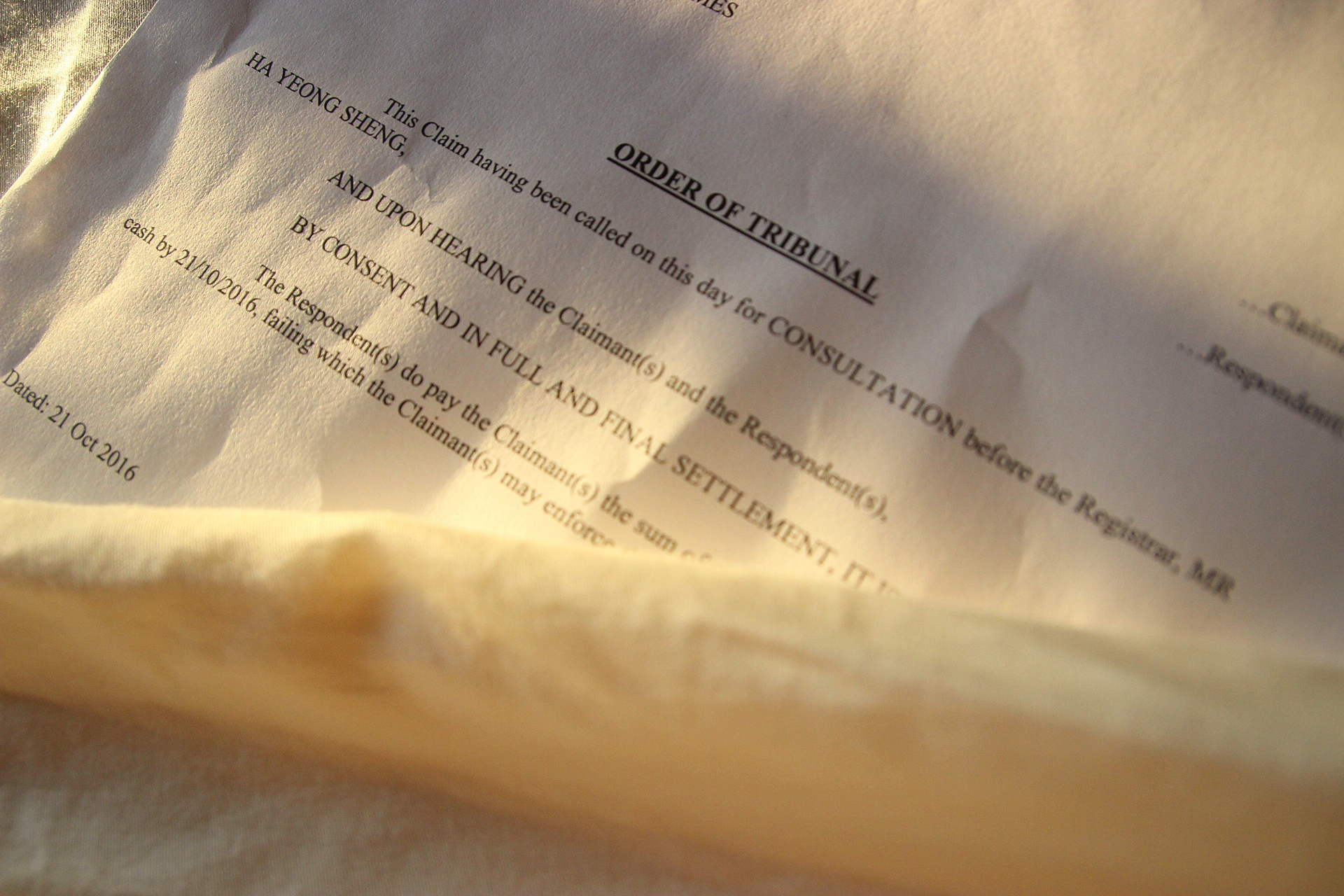
{Blanket over, case closed}
I loved É’s analogy: If you paid to stay at a hotel for a few days and it turned out to be dirty, moldy, smelly and broken, what would you do – Would you keep quiet and just stay there or would you lodge a complain and ask for your money back?













